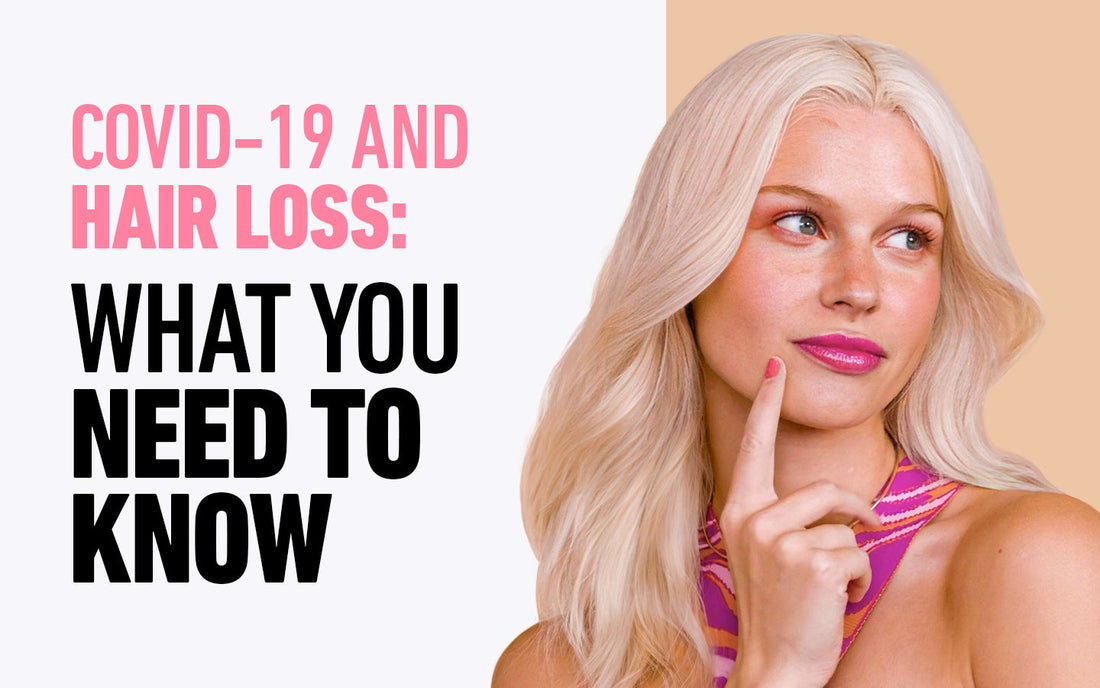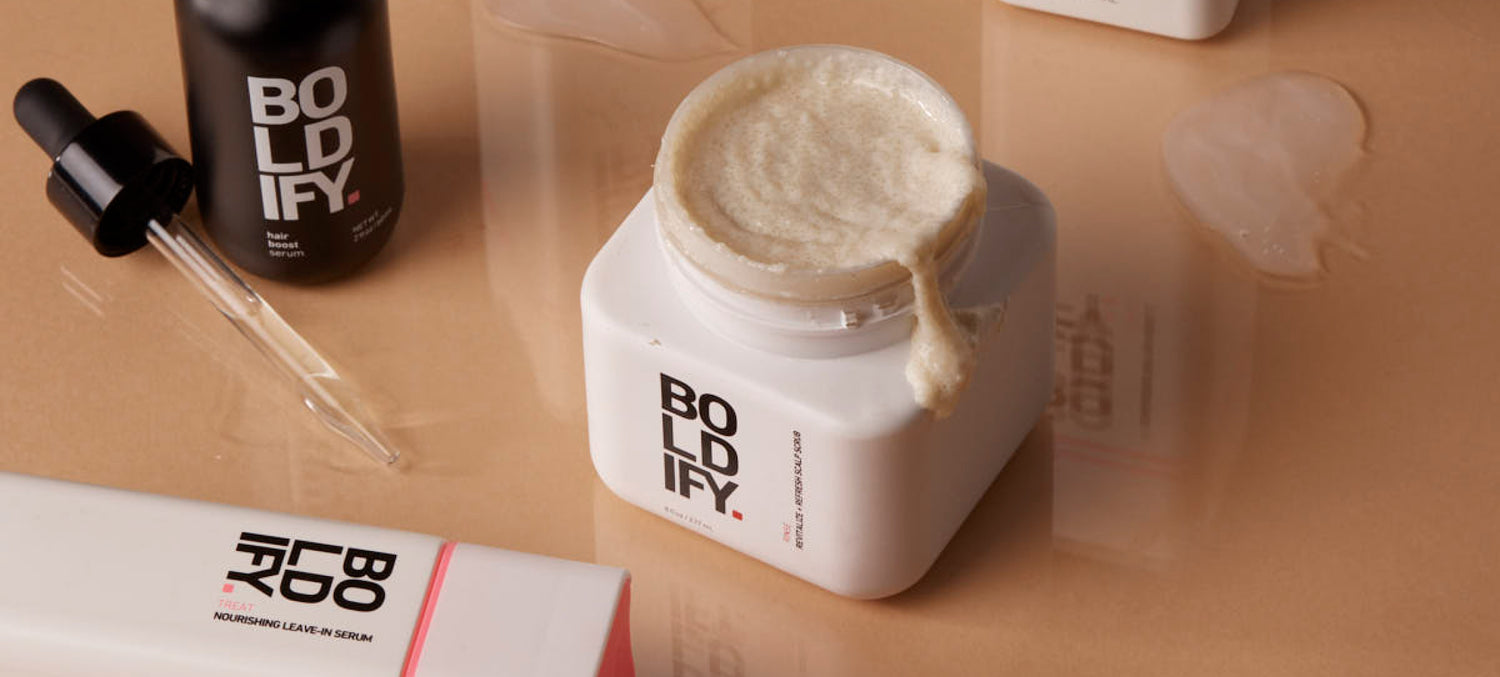COVID-19 and Hair Loss: What You Need to Know

If you or a loved one have experienced hair loss after having COVID-19, you’re not alone. While the CDC doesn’t include hair loss on its list of recognized coronavirus symptoms, many people have reported excess hair shedding after recovering from the virus. The good news is that post-COVID hair loss is usually temporary and resolves on its own.
Read on to discover why COVID-19 survivors may suffer from hair loss-- and what you can do about it.
What causes post-COVID hair loss?
Experts believe that the novel coronavirus itself doesn’t directly cause hair loss. Instead, the virus can trigger inflammation and an acute stress response in the body. This means that non-essential functions like hair growth may be paused, freeing up more resources for your body to deal with the stressor (in this case, fighting the virus).
In essence, some of your hair is shifted from the “growing” (anagen) phase to the “resting” (telogen) phase. The telogen phase lasts about three months, and then those strands fall out. This condition, called telogen effluvium (TE), can be caused by any severe and abrupt stressor. Besides COVID-19, some common causes include childbirth, surgery, rapid weight loss, trauma, bereavement, or even the day-to-day stress of coping with a pandemic.
Since it takes time for the hair to actually fall out, TE may not be noticeable until 3-4 months after having COVID-19. The first sign may be that your hair has stopped growing, followed by excess shedding a few months after recovery. Hair loss is most likely to occur in people who experienced severe or “long-haul” COVID. It may also occur more often in those who had very high overall stress levels before contracting the virus.
How is post-COVID hair loss diagnosed?
Hair shedding is a normal part of the hair cycle. Everyone loses a certain number of hairs each day (usually between 50 and 100) and this is not a cause for concern. The warning sign is when there is a change in your hair fall pattern. If you find that you’re suddenly losing much more hair than usual, that’s a signal that you need to see a professional.
There is no single test for COVID-induced telogen effluvium. Your doctor may recommend blood work to rule out other possible causes of hair loss, such as a thyroid issue or nutritional deficiency. She may also ask about your other life stressors, health conditions, and lifestyle to help pinpoint the cause(s). If your hair loss appeared suddenly a few months after a coronavirus infection, and there are no other obvious triggers, then it’s likely that your body’s response to the virus contributed to the hair loss.
How long does hair loss continue after having COVID-19?
The good news is that post-COVID telogen effluvium is generally temporary, does not damage the hair follicles, and resolves on its own. The bad news is that hair regrowth takes time.
Intense hair shedding may last for 3-6 months. After that, the hair will gradually return to its normal growth cycle and fall pattern. The hair may still look thinner than it did before, but it will no longer be shedding as much. As new hair grows in, you may start to notice small “baby hairs” around your hairline. Over time, your hair will gradually get thicker and fuller again and return to its normal appearance.
Natural Home Remedies for COVID-19 Hair Loss
Step away from the sketchy “hair growth creams”, pills and miracle cures! These do not work to combat post-COVID hair loss and may even make the problem worse.
Hair shedding is a normal bodily response to a stressful event such as COVID-19 illness. Once the stressor is gone, the hair will stop falling out and eventually grow back. This is a natural process, and unfortunately there’s not much you can do to speed it up. The best thing you can do is to be patient, gentle and kind with your body and focus on taking good care of yourself while you heal.
Here are a few tips that may be helpful:
Eat for Healthy Hair Growth
COVID-19 and stress both cause inflammation in the body, which can lead to hair thinning and slower hair growth. A great way to combat this is to eat foods rich in anti-inflammatory Omega-3 fatty acids. Some of the best Omega-3 sources include walnuts, flaxseeds, chia seeds, and fatty fish such as salmon, mackerel and herring.
Colorful fruits and vegetables, especially tomatoes, berries and leafy greens, are packed with amazing benefits for your hair and overall health. They provide antioxidants that fight oxidative stress, reduce inflammation, and support healthy, vibrant hair.
Get Fresh Air and Exercise
Once you’re feeling well enough (and out of quarantine, of course!), hit the trails for a walk, run or bike ride. Exercise is a proven stress reliever, especially when you exercise out in nature. Plus, cardiovascular exercise boosts blood flow to deliver more nutrients and oxygen to your hair follicles.
Reduce Stress in Healthy Ways
While it may be tempting to spend hours staring at your thinning hair in the mirror and criticizing your appearance, this will only make you feel bad and increase your stress. The goal should be to get your stress levels as low as possible so that your body feels “safe” to resume its normal hair cycle.
Make a list of healthy activities you can do to relieve stress, and try to do at least one thing each day. Need some ideas? Here are a few proven stress busters to try:
- Read a funny book or watch a funny movie. Laughter is SO good for your body and mind!
- Throw on your favorite leggings and do a yoga flow. You don’t have to be flexible to reap the mental and physical benefits of yoga! Check out this beginner-friendly YouTube playlist by Yoga with Adriene.
- Take a screen break. Even just turning off your devices for a few hours can help you relax, be more mindful, and enjoy quality time with family and friends.
Work on a hobby. Knitting, gardening, woodworking, playing music, writing… anything that helps you unwind and express yourself is perfect for reducing stress!
- Find new ways to style your hair that make you feel confident. Looking and feeling good isn’t superficial-- it’s important for your self-esteem! (See below for our best tips and products for thinning hair.)
One final note about stress relief-- you probably can’t remove all life stressors, but sudden hair loss is a red flag that your body is struggling to cope. If possible, try to avoid adding new stressors during this healing period. Now may not be the best time to train for a marathon or start a demanding new job. Take care of your body first, and it will take care of you!
Medical Treatments for COVID-19 Hair Loss
If your hair loss is severe, causing you emotional distress, or accompanied by other symptoms like an itchy scalp or rash, medical help is available. A dermatologist who specializes in hair loss can work with you to create a treatment plan.
In the meantime, using the right products can help you style your thinner hair and feel good about your appearance. In the next section, we’ll talk about some options to conceal hair loss while your strands grow back.
Thriving with Post-COVID Hair Loss
How can you make the most of the hair you do have while dealing with COVID-induced hair loss? The most important thing is to avoid damaging your hair, which can cause it to break off and look even thinner. Avoid or minimize color treatments and heat styling, use gentle products, and treat every strand with care. Thickening shampoo and conditioner can help to plump up your hair and make your mane appear fuller. We also recommend using thickening spray for an extra volume boost.
If you have a more extreme case of post-COVID hair loss, you may notice bald patches around your head or areas of scalp show-through. This can be really distressing, but remember that your hair will most likely grow back in time.
While you wait, there are natural and effective options to conceal your hair loss. BOLDIFY Hair Thickening Fibers adhere to your hair and instantly cover up thinning, balding or patchy areas. They blend perfectly with your natural color and stay put all day-- no one ever needs to know! Use these hair fibers with BOLDIFY Hairline Powder if you have hair loss around your hairline. You can find our hair thickening and hair building must-haves in the BOLDIFY shop.
While there are no quick fixes for post-COVID hair loss, the body has an amazing ability to heal itself with time and proper care. As long as your stress levels are well-managed, your hair will generally return to normal on its own. Taking care of your mental and physical well-being will help you feel more confident and get “back to baseline” as quickly as possible.
Want even more tips and tricks for your hair growth journey?
Sign up for our newsletter for VIP Access to new Boldify Blogs as soon as they’re released (plus tons of other exclusive goodies).
Check some options for Hair Building


